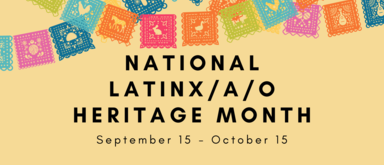
Dear Students, Staff, & Faculty,
Happy National Latinx/a/o Heritage Month! From September 15 to October 15, the United States celebrates the histories and cultures of Latin America with art, music, gatherings, and much more. This month-long recognition begins on September 15 every year to acknowledge when five Latin American countries gained independence from Spain: Costa Rica, El Salvador, Guatemala, Honduras, and Nicaragua.
This celebratory month is also known as National Hispanic Heritage Month, which expanded from the original National Hispanic Heritage Week, which was proposed in a bill by California Representative George Edward Brown. The bill was passed and signed off by President Lyndon B. Johnson. Several years later, California Representative Esteban Torres submitted a bill to extend National Hispanic Heritage Week into a whole month. Representative Torres stated that a week did not give enough time for the U.S. to honor all the rich histories of Hispanic Americans throughout history. Although this bill did not pass, Illinois Senator Paul Simon later introduced a similar bill which was passed and signed by President Ronald Reagan in 1988, formally extending the recognition to a month-long event.
Fast forward to the present, the conversation has shifted from how long we celebrate this month to who we celebrate this month. Across various media, the words "Hispanic" and "Latino/a" have been used interchangeably, yet these terms actually denote different populations. The word "Hispanic" has been used in the U.S. Census to denote anyone who speaks Spanish or is a descendent of Spain or a Spanish-speaking country, such as Mexico or Colombia. However, this definition excludes countries in Latin America that don't speak Spanish, such as Brazil, where the official language is Portuguese. To encompass all residents and descendants of Latin America, the terms "Latino" and "Latina" are used. Some prefer these terms, as they do not hold any ties to Spain, who had colonized many countries in Latin America. This seems fitting since it starts on the same date of many countries who won independence from Spain.
More recently, discourse has revolved around intersecting identities within the Latino/a community. One example is people who are both residents/descendants of Latin America and identify as LGBTQ+. Because Spanish is a grammatically gendered language, the word "Latinx" has been used as a gender-inclusive form of the words "Latino/a." The term "Latinx" first came about in the early 2000s and was coined by LGBTQ+ members of the Latinx community.
While the term "Latinx" has been welcomed by some, others have considered it a form of linguistic imperialism. First, the term is used almost exclusively in the U.S., thus it seems to impose Western norms onto the Spanish language. Second, while the term has multiple pronunciations in English, it is difficult to pronounce in Spanish, so it can alienate the very people it aims to describe. Third, though the term tends to be used in higher education spaces, it hasn't been widely adopted by the general public, so it may come off as elitist. Although the debate of using "Hispanic," "Latino/a," or "Latinx" continues within various communities, the overarching premise is that what one chooses to identify as is a personal choice that should be respected along with the cultures and histories that are celebrated throughout this month.
Here at the University of Iowa, the Multicultural & International Student Support & Engagement (MISSE) team will partner with various organizations on campus to host a series of events throughout the next few weeks to celebrate Latinx/a/o Heritage Month and the 50th anniversary of the Latino Native American Cultural Center (LNACC)! To see upcoming events, check out the university's Latinx Heritage Month page or visit LNACC's social media on Instagram or Facebook.